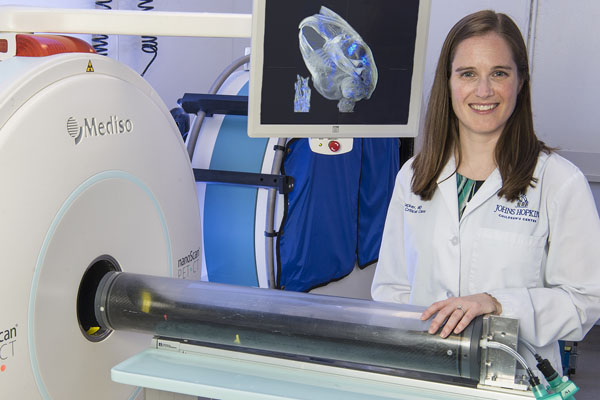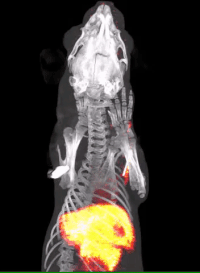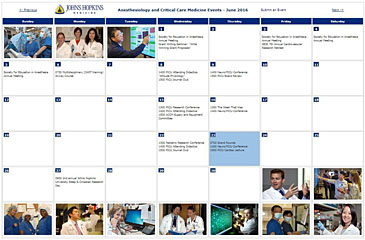
The long-term goal of the Tucker lab is to understand the pathogenesis of brain injury during central nervous system (CNS infections in children and design antimicrobial and adjunctive therapy as well as therapeutic monitoring to improve treatment and prognosis of children with these devastating infections.
Our current focus is in Tuberculous meningitis (TBM), one of the most devastating forms of meningitis and it is associated with significant morbidity and mortality secondary to neuroinflammation.
In pursuit of this long-term goal, we have developed the first pediatric animal model of CNS TB, demonstrating leptomeningeal inflammation, brain tuberculoma formation, neuroinflammation with microglia activation and neurologic abnormalities (motor deficits, seizures) similar to neurologic symptoms seen in children with CNS TB. We have utilized immunohistochemistry examination, neurobehavioral monitoring, and in vivo live animal positron emission tomography (PET)/ computed tomography (CT) imaging to monitor neuroinflammation, elucidate pathogenesis and noninvasively monitor antimicrobial biodistribution to understand pharmacokinetics and how penetration into the brain changes over the duration of treatment.
 Elizabeth W. Tucker, MD
Elizabeth W. Tucker, MD
Johns Hopkins Bloomberg Children’s Hospital
Department of Anesthesiology and Critical Care Medicine
Division of Pediatric Anesthesiology and Critical Care Medicine
1800 Orleans Street, Room 6346
Baltimore, MD 21287
(410)-955-9408
etucker9@jhmi.edu
Principal Investigator: Dr. Liz Tucker
Dr. Tucker is an Assistant Professor in the Pediatric Anesthesiology and Critical Care Medicine division of the ACCM at Johns Hopkins University School of Medicine. She is a clinician-scientist who cares for children in the Pediatric Intensive Care Unit, with a particular focus in neurocritical care medicine. Her research investigates the pathogenesis of brain injury in meningitis and drug biodistribution during the course of infection by utilizing an animal model of Tuberculous meningitis (TBM).
Collaborators/Mentors
Dr. Tucker’s research benefits from a strong network of collaborators in neuroscience, pediatric infectious disease, nuclear medicine, pharmacology and nanomedicine, including her mentors Dr. Sujatha Kannan and Dr. Sanjay Jain. These mentors and collaborations provide unparalleled expertise and contribute immensely to Dr. Tucker’s research projects.
Dr. Sujatha Kannan is a pediatric critical care attending in Johns Hopkins’ Pediatric Intensive Care Unit and is a clinician-scientist with expertise in neuroinflammation in the developing brain and development of nanotechnology to enhance drug delivery to the brain.
Dr. Sanjay Jain is a pediatric infectious disease attending at Johns Hopkins’ Children’s Center and is a clinician-scientist with expertise in pediatric meningitis, tuberculosis, noninvasive positron emission tomography (PET) imaging and development of novel PET tracers. Dr. Jain is also the Director of the Center for Infection and Inflammation Imaging Research with state-of-the-art facilities for noninvasive imaging of small animals which Dr. Tucker’s lab utilizes for her research.
 With funding from NIH NIAID K08 Mentored Clinician Scientist Research Career Development Award, the Tucker lab will work to optimize dosing of new TB antimicrobial drugs at the site of infection, perform multimodality PET imaging to determine the interaction of bacterial burden, inflammation and antimicrobial penetration at the site of infection and test adjunctive host-directed therapy.
Additionally, the Tucker lab is funded through the Hartwell Individual Biomedical Research Award (https://research.weill.cornell.edu/funding/funding-opportunities/hartwell-foundation-individual-biomedical-research-awards) to develop a novel theranostic agent to diagnose neuroinflammation, treat neuroinflammation and monitor response to treatment in order to improve outcomes in pediatric meningitis.
With funding from NIH NIAID K08 Mentored Clinician Scientist Research Career Development Award, the Tucker lab will work to optimize dosing of new TB antimicrobial drugs at the site of infection, perform multimodality PET imaging to determine the interaction of bacterial burden, inflammation and antimicrobial penetration at the site of infection and test adjunctive host-directed therapy.
Additionally, the Tucker lab is funded through the Hartwell Individual Biomedical Research Award (https://research.weill.cornell.edu/funding/funding-opportunities/hartwell-foundation-individual-biomedical-research-awards) to develop a novel theranostic agent to diagnose neuroinflammation, treat neuroinflammation and monitor response to treatment in order to improve outcomes in pediatric meningitis. - Tucker EW, Pokkali S, Zhang Z, DeMarco VP, Klunk M, Smith ES, Ordonez AA, Penet A-F, Bhujwalla Z, Jain SK, Kannan S. Microglia activation in a pediatric rabbit model of Tuberculous Meningitis. Dis Model Mech. 2016 Dec 1;9(12):1497-1506.
- Tucker EW and Kannan S. Immunomodulation in critical illness: The quest continues… Pediatr Crit Care Med. 2017 Feb;18(2):190-191.
- Shrot S, Poretti A, Tucker EW, Soares BP, Huisman TA. Acute brain injury following illicit drug abuse in adolescent and young adult patients: Spectrum of neuroimaging findings. Neuroradiol J. 2017 Apr;30(2):144-150.
- Tucker EW, Jain SK, Mahesh M. Balancing the risks of radiation and anesthesia in pediatric patients. J Am Coll Radiol. 2017 Jul 24.
- Tucker EW and Dooley, KE. Pre-clinical tools for evaluation of tuberculosis treatment regimens for children. Int J Tuberc Lung Dis. 2018 May 1;22(5):7-14. doi: 10.5588/ijtld.17.0354. PMID: 29665948.
- Jain SK, Tobin DM, Tucker EW, Venketaram V, Ordonez AA, Jayashankar L, Siddiqi OK, Hammoud DA, Prasadarao NV, Sandor M, Hafner R, Fabry Z. Tuberculous meningitis: A roadmap for advancing basic and translational research. Nat Immunol. 2018 Jun;19(6):521-25.
- Tucker EW, Guglieri-Lopez B, Ordonez AA, Ritchie B, Klunk MH, Sharma R, Chang YA, Sanchez-Bautista J, Frey S, Lodge MA, Rowe SP, Holt DH, Gobburu J, Peloquin CA, Matthews WB, Dannals RF, Pardo CA, Kannan S, Ivaturi V, Jain SK. Noninvasive 11C-Rifampin Position Emission Tomography Reveals Drug Biodistribution in Tuberculous Meningitis. Sci Transl Med. 2018 Dec 5; 10 (470).
- Rohlwink UK, Walker NF, Ordonez AA, Li YJ, Tucker EW, Elkington PT, Wilkinson RJ, Wilkinson KA. Matrix metalloproteinases in pulmonary and central nervous system tuberculosis—A review. Int J Mol Sci. 2019 Mar 18;20(6).
